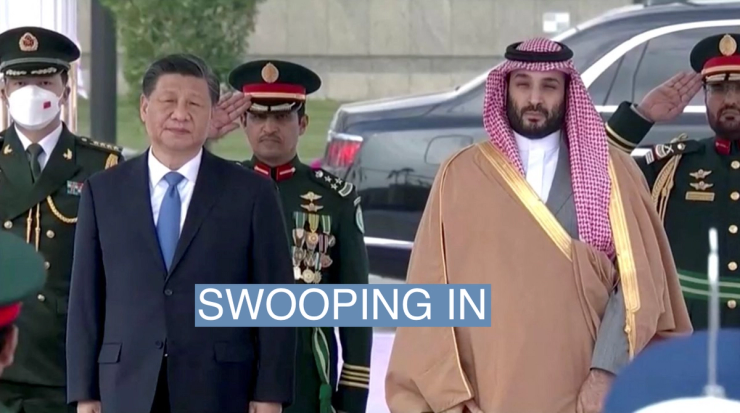The News

The Saudis are hosting China’s Xi Jinping this week for a bilateral summit as well as meeting with the Arab League and the Gulf Cooperation Council. From the perspective of Beijing or Riyadh, these are huge meetings and they should be seen that way by Washington as well.
In this article:
Steve’s view
The US-Saudi relationship is a total mess right now. Saudi human rights abuses and the murder of Jamal Khasshoggi are fundamental conflicts that won’t go away, and the Saudis led OPEC to cut oil production right before the midterm elections, angering Joe Biden. The question at this point is whether America’s disdain of Saudi leader Mohammad bin Salman, better known as MBS, has created a strategic opening for China.
Ali Shihabi, former Arabia Foundation President and a well-known Saudi commentator, told me the Saudis are likely to give Xi, who cares much less about Khasshoggi and the state of human rights in the Kingdom, much better treatment than they gave Biden and that Americans should take note.
“U.S. politicians keep defining the Kingdom by the Khashoggi murder (which Crown Prince MBS admitted four years ago was a horrible mistake), the Yemen war (which Saudi has been doing everything within its power to end for more than two years), and human rights,” he said.
American intelligence services found that the Crown Prince likely ordered Khashoggi’s murder. That’s hard to just set aside. So I asked him whether Saudi Arabia developing a better relationship with China was a way to sidestep U.S. pressure on human rights and the Khashoggi tragedy?
“Let us not forget that US intelligence has made many wrong calls in the past so its conclusions cannot be taken as definitive,” he said.
He chalked up conflicts, to the extent they exist, on growing pains on the way to modernization, which Saudi leaders are wary of speeding up too quickly.
“We know that such transitions throughout history have led to instability and chaos,” he said. “Think of the religious wars in Europe or the 1979 Iranian Revolution.”
Regardless of the pace of internal reforms, he said, expect the Saudis to keep hedging their bets with an ambivalent U.S., which means boosting long-term relationships with China, India, and Russia on energy and countries like the UK and France in areas like military sales.
Room for Disagreement
On the other side of the ledger, some might argue that the Saudi-U.S. relationship is healing already, however slowly and painfully. In a highly controversial decision, the White House and U.S. Justice Department allowed Saudi de facto leader MBS to evade U.S. legal accountability for the murder of Khasshogi by recognizing him being appointed “prime minister” in addition to Crown Prince, triggering “sovereign immunity” protection. And in the last month’s OPEC meeting, the Saudis chose not to further cut oil production even though the price of oil is declining, an act many see as a gesture to mollify an angry White House.

